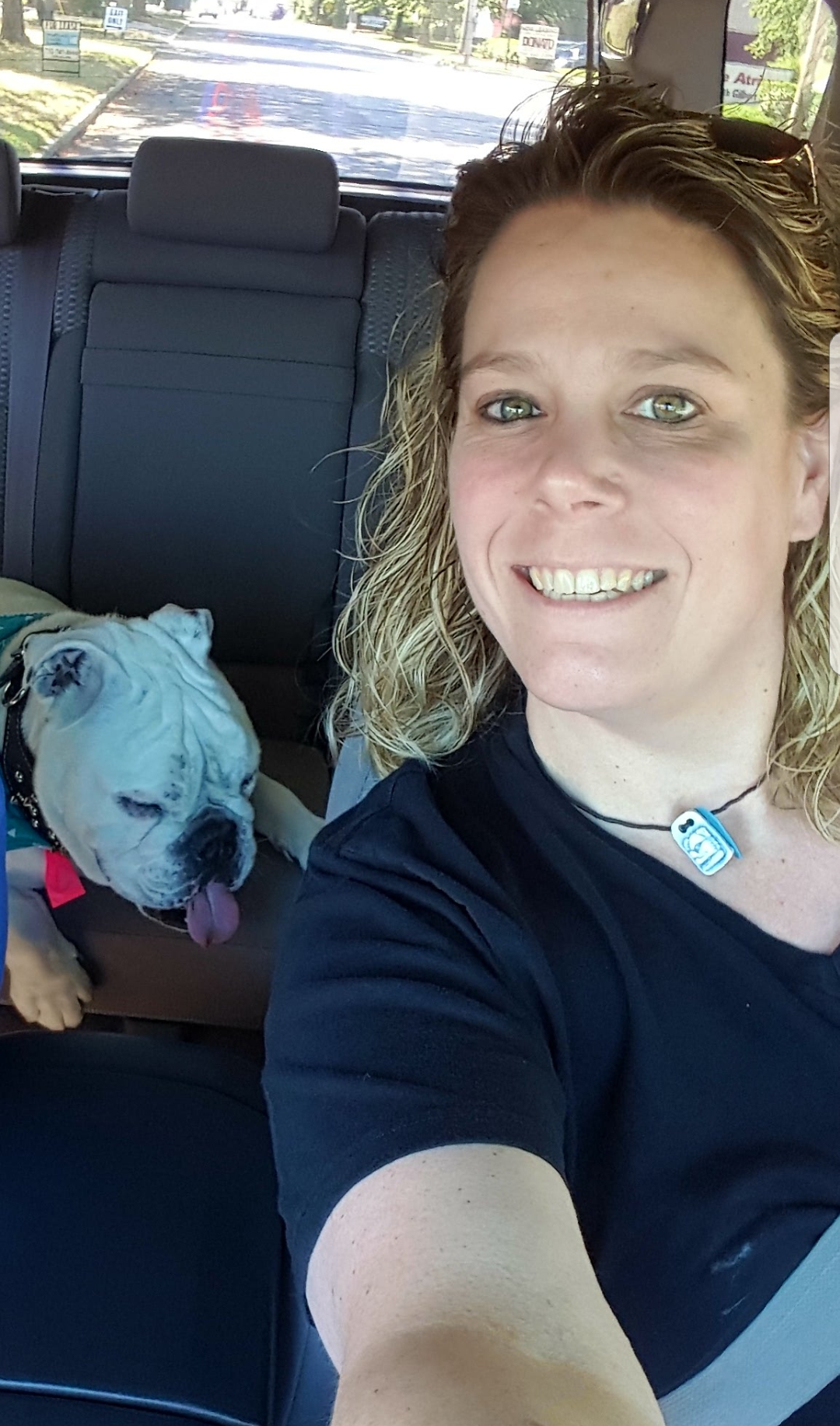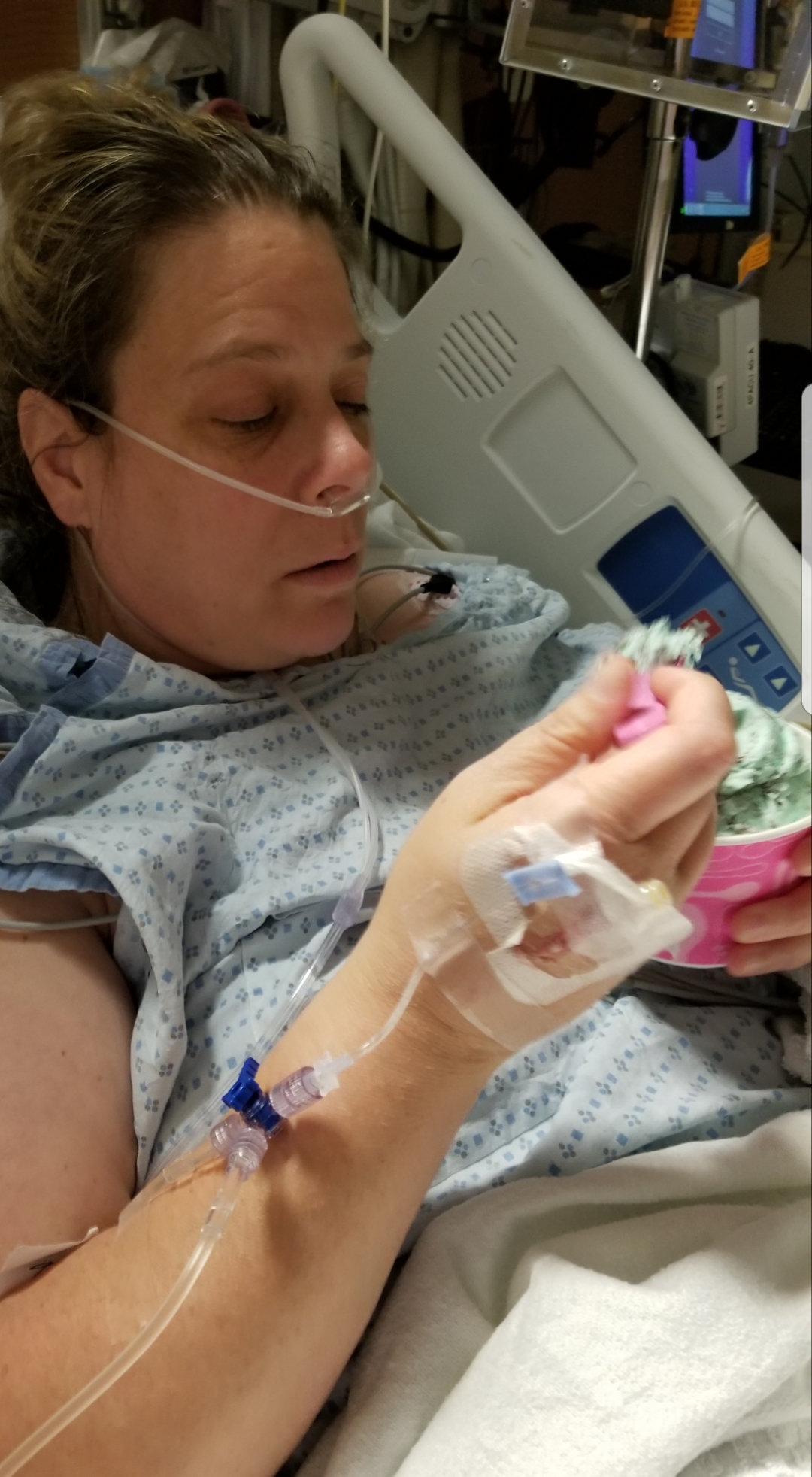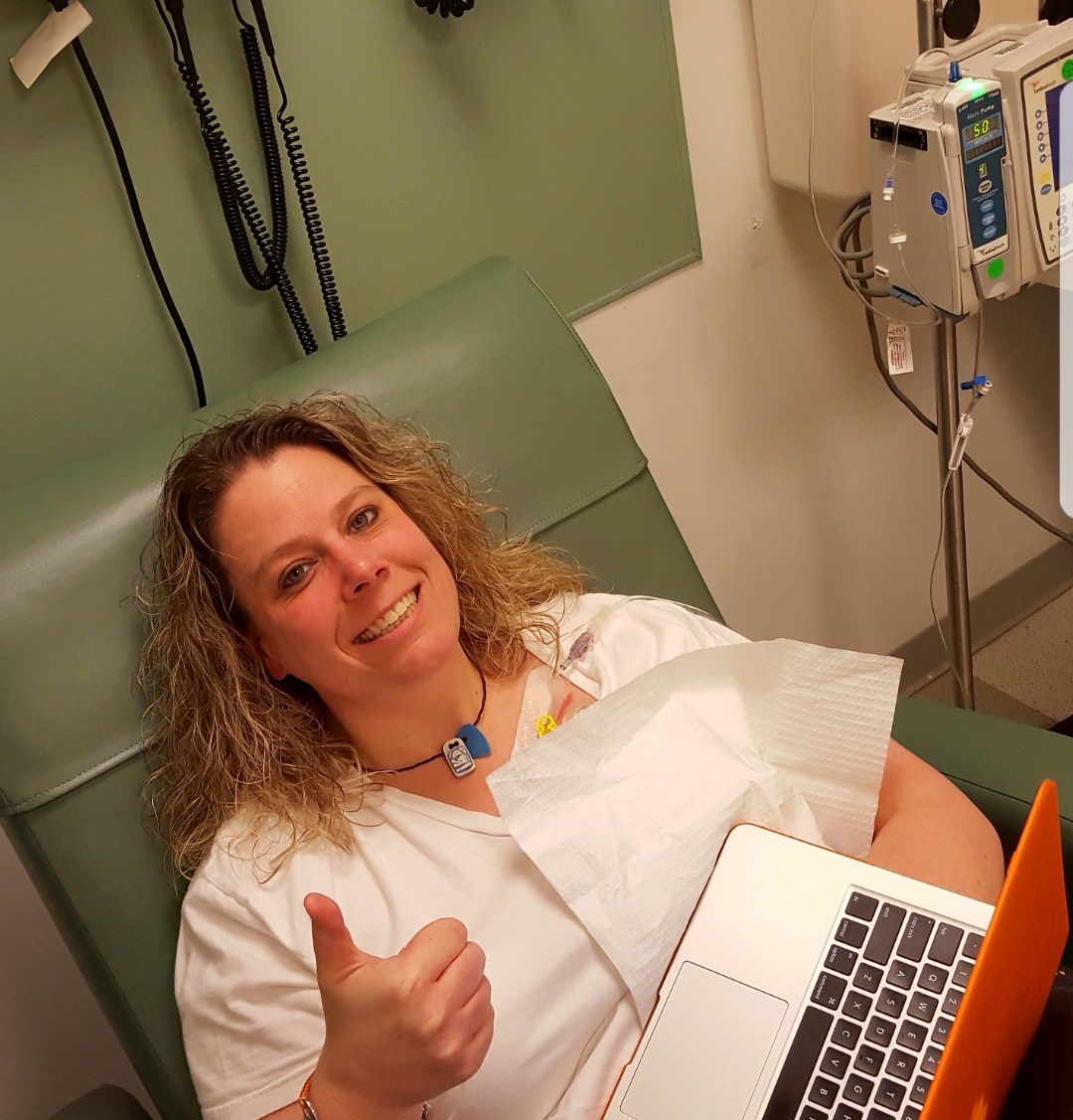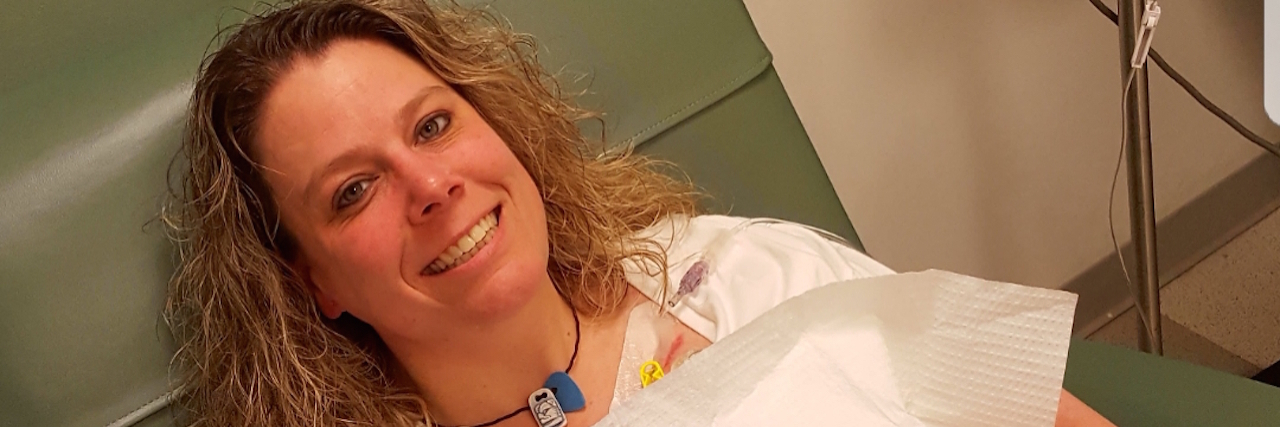In each of these pictures in this article, I have full body, systemic complex regional pain syndrome (CRPS), severe autonomic dysfunction, kidney disease, and a slew of significant complications that go along with the CRPS that have plagued my body for the last four years. Other than the picture in the hospital gown, do I look sick to you? That’s one of the challenges of having an invisible illness, and there are upsides and downsides to both. Here are a few.
I have to go with the downsides first. For some, if you’re looking good on the outside, you’re either “faking your illness” or making your condition far worse than it really is. We all know outward appearances are everything and almost always 100 percent accurate.
Another downside is, if I have the energy to get up, shower, get dressed, do my hair and try to look presentable, I must be feeling better and my pain levels are low…because I “look great.” That’s another common misnomer because the truth is, it took just about everything I had in the tank to look like this. Feel free to unexpectedly stop by the house on any given day and trust me, I don’t look like what’s depicted in the pictures. Well, maybe the one where I’m eating ice cream. That one’s fairly accurate. But for me to get out of the house for a few hours usually takes two to three days on the couch just to have the energy to be social. It’s absolutely exhausting. Still, for a change of scenery, it’s totally worth it.

Also, it breaks my heart when someone tells me I look “great.” Why? Because I’d give just about anything for the inside to match what the outside looks like. Sadly, it rarely does. Telling me how good I look is sometimes a reminder that that’s not my reality, and it won’t be for the foreseeable future. That’s a hard thing to swallow because I often feel like shells of my former self. At the same time, I really am grateful for the compliments. That’s tough to navigate too.
I’ve learned to get good at faking smiles. I smile through pain. I smile through nausea, vomiting, and yes, I’ll say it, diarrhea. I smile through the exhaustion and only the ones who know me best know how I’m really doing at any given time. Some days I’m super grateful for my theater background because it really does come in handy. Who knew I’d apply it this way later in life? But hey, it works!
I’ve also learnt how to throw up silently in public restrooms so as not to call attention to myself. I’ve gotten to know my body so well that I know exactly how much time I’ll need to get to that bathroom so I don’t throw up in front of anyone. Sometimes it can’t be helped, but it can feel embarrassing nonetheless. The fact that I feel like I have to be “on” whenever I walk out the door is not only tiresome, but it’s depressing.
How great would it be to take down those walls and be your true, authentic self? But then, if you’re having a rough day and you feel like shit, and you show it, you’re depressing everyone else around you. Or, you get sympathy. And for me, sympathy, pity, feeling sorry for me or my situation simply does not work. I draw strength from encouragement. Not pity.
Surprisingly, there are upsides to invisible illnesses too. Sometimes, by balancing them out with the other stuff, it helps get you through the downsides.
One upside is you can really learn who your true friends are. You have a front row seat to the judgement others place on you and sometimes that tells you all you need to know about that person. They say true character is shown – not by what you say to someone’s face, but rather, what you say about them behind their back. I’ve learned some valuable lessons and have found some definite clarity in that, and I’m grateful. It always amazes me when acquaintances think they “know” me enough to be entitled to have a front row seat to the story of my life…and then cast their judgement on me simply from the things I’ve allowed them to see. Invisible illnesses magnify this, I think, and it can show you how shallow some really are.

When their true colors do show through, you have a choice whether you want to accept it or not. The reality is, life is way too short to seek and depend upon the approval or acceptance of others. If your friends love you, there is no judgement. And if there is, move on. There are tons of wonderful people out there who would love to love for you just the way you are.
Another upside? I don’t take simple things for granted, and the joy of the little things really do make me happy. For example, I still can’t wear shoes. I’m still in flip flops. But, I can rock a good pair of flip flops! And I can feed myself now and keep the food on the fork. I even cut my own food. There was a time I could do neither. I love doing our laundry because it makes me feel like I’m still contributing to the household chores, which is a huge boost in self-esteem! How many people complain because they have to do laundry on the weekends? I celebrate the fact that I still can!
We often learn to celebrate the small things and we appreciate the fact that we still get to do them. That’s good stuff!! The things that used to be so important, such as where we’re going this weekend, what we’re doing, and who we’re doing it with, no longer matter. Going somewhere or doing something with anyone is now what matters. And that could be something so simple as a movie, lunch, or even just running an errand. It doesn’t really matter what it is. It’s something, and that’s good stuff.
And the best upside to an invisible illness? We learn how to break down our walls of stubbornness and ask for help when we need it.
That’s been a tough one. Vulnerability is an extraordinarily difficult concept for me to grasp. I’ve always been fiercely independent and I’m still guilty of fighting it at times. But, when you do let those walls down, even if it’s only for a select few people…you may learn that you don’t always have to be the strong one. You may learn that even at your worst, you’ll still be loved, accepted, wanted, and valued.
There’s only one person I’ve let my walls completely down for. Most times, “my person” knows me better than I know myself. She knows when I’ve had enough, even before I do. She knows when it’s time to go home. She knows when I’m good enough to go out. I love that I don’t have to say a word. She challenges me to push just a little bit harder on my “good” days, and she literally makes me back way off on the “bad.” She knows by looking in my eyes how sick I feel, even if my words insist otherwise. She has seen me at my absolute worst, at my absolute sickest, and even in my darkest hours, somehow she can still make me smile. That’s a tall order for anyone, I think. I’ve learned how to trust that and in the process, I’ve learned how to trust myself just a little bit more.
I think it’s fair to say that I’ve learned a lot about myself since CRPS decided to act like an annoying house guest who visits for a weekend, and then makes excuses as to why, after a week, they haven’t left yet. Except with CRPS, it often overstays its welcome by a lifetime. Still, I’m certain I know more about me now than I ever have.

I absolutely hate being sick. Who in their right mind would say they love this disease? But I cannot say that the clarity I’ve found in my priorities, the clarity found in the ability to see people for who they truly are, finding the beauty in the small things in life, and learning that celebrating the simplest of tasks can open more emotional doors than giant feats ever could…I can’t say that I regret those lessons.
I can’t say I wouldn’t have learned or appreciated them as much had I not gotten CRPS. I still have really bad days, and those days still far outnumber the good. They can be absolutely awful and I wouldn’t wish them on my worst enemy, no matter what they did. I would give anything for a cure. But since that’s not my reality right now, I play the best hand I was dealt and I see what happens. It’s the best we can do.
Sometimes I think invisible illnesses are like the book covers on the New York Times Best Seller list. The story depicted on the cover may look tame, nondescript, or it could look wildly amazing. Those covers are important. It’s what often gets you in the bookstore. It can be what gets you to buy the book. It’s even what gets you to start reading the first chapter. But it’s what’s written on those pages that actually keep you reading until you finish that book.
What we need to explain to those who love us is this: don’t judge us on our appearance. Good or bad. Take the time to look beneath the surface. Appearances aren’t always what they seem and you can’t judge a book by its cover. How’s that for cliche? But it’s very true and in reality, I think that’s how life is supposed to go, too. For me, I think it took getting sick to realize that. No matter how negative our challenges can feel, there’s always room to find some positives too.
It’s CRPS awareness month. Make your contribution to this world count. Every. Single. Day. Because no matter what, you matter. You always will.

